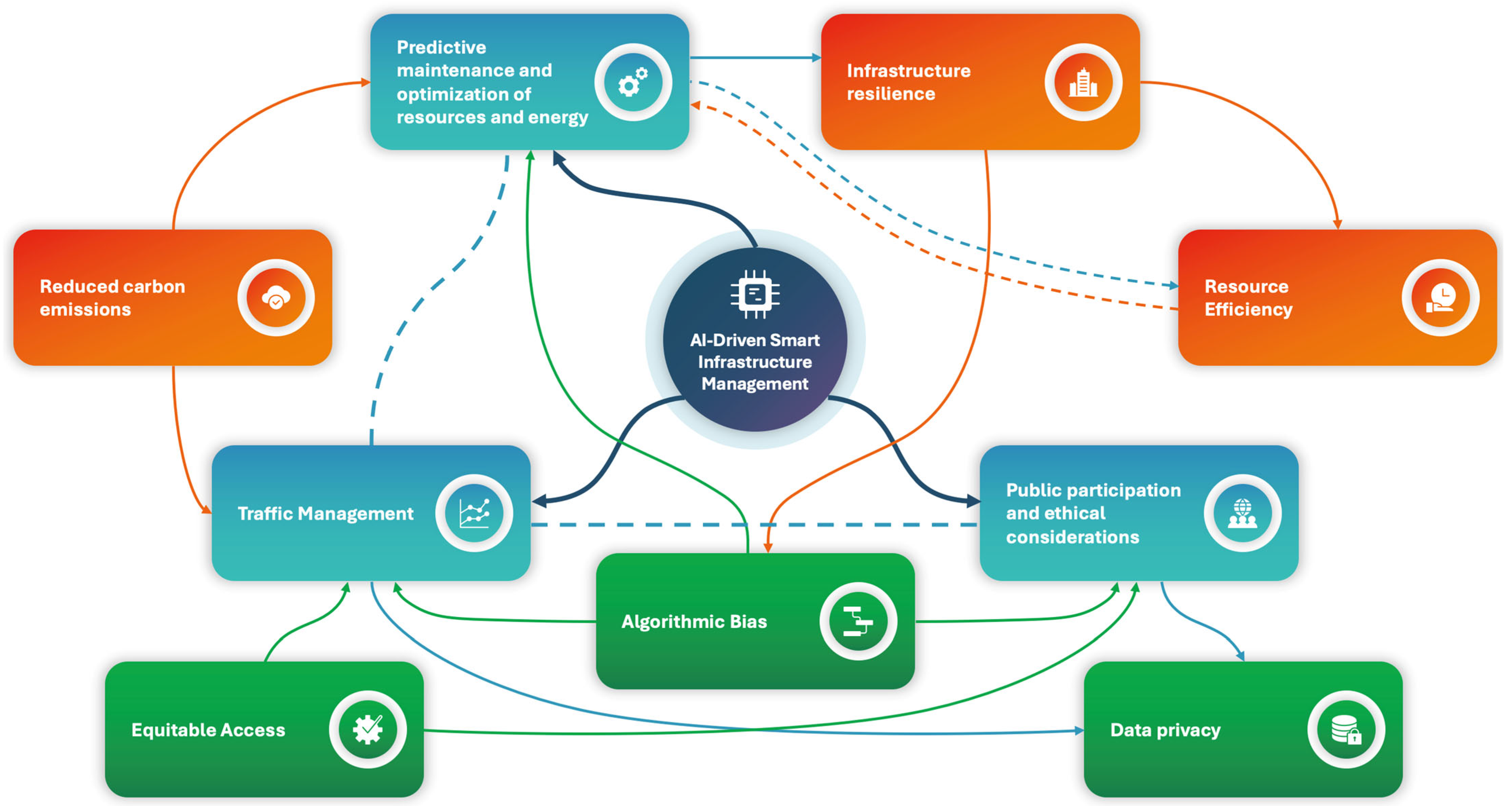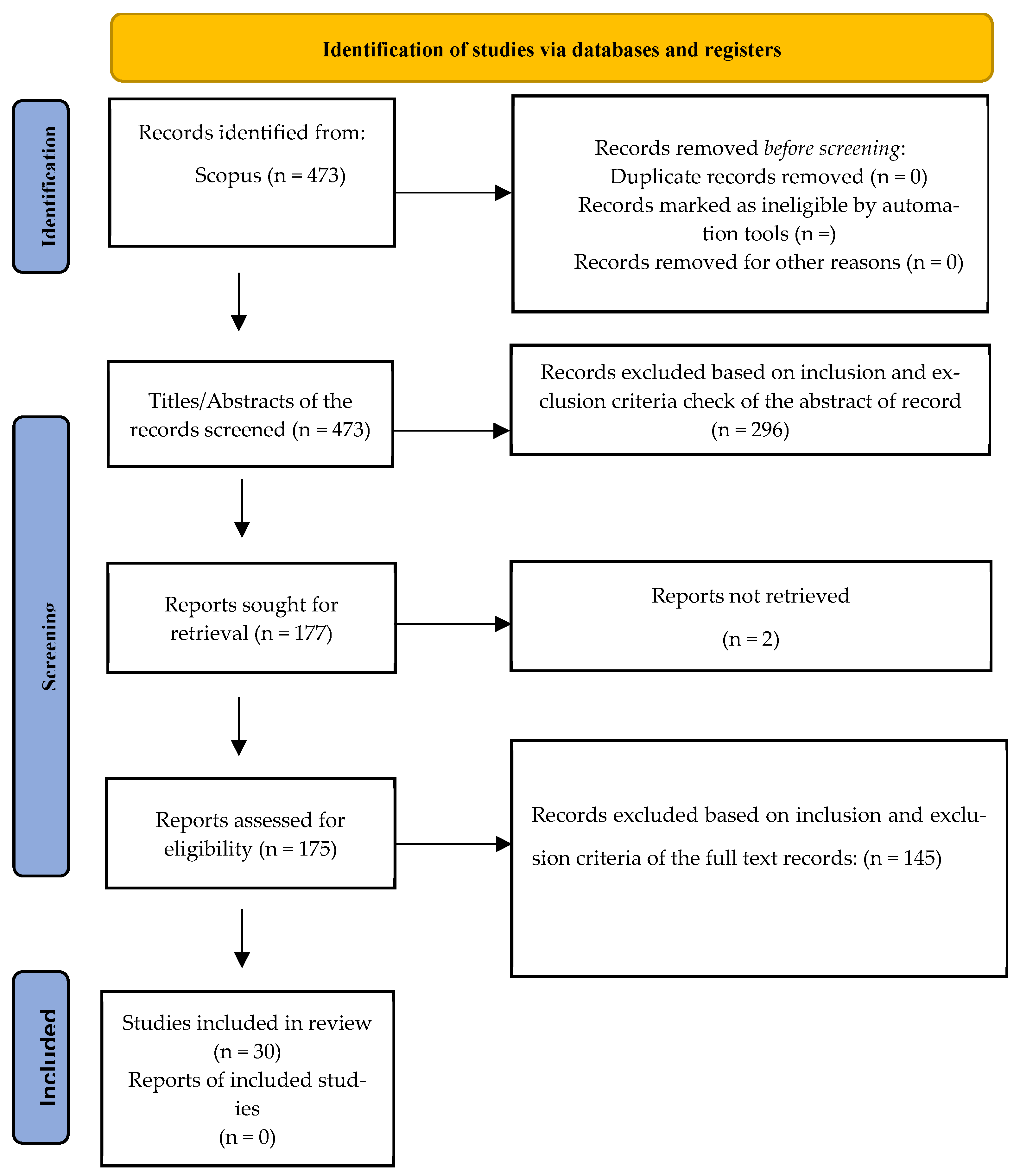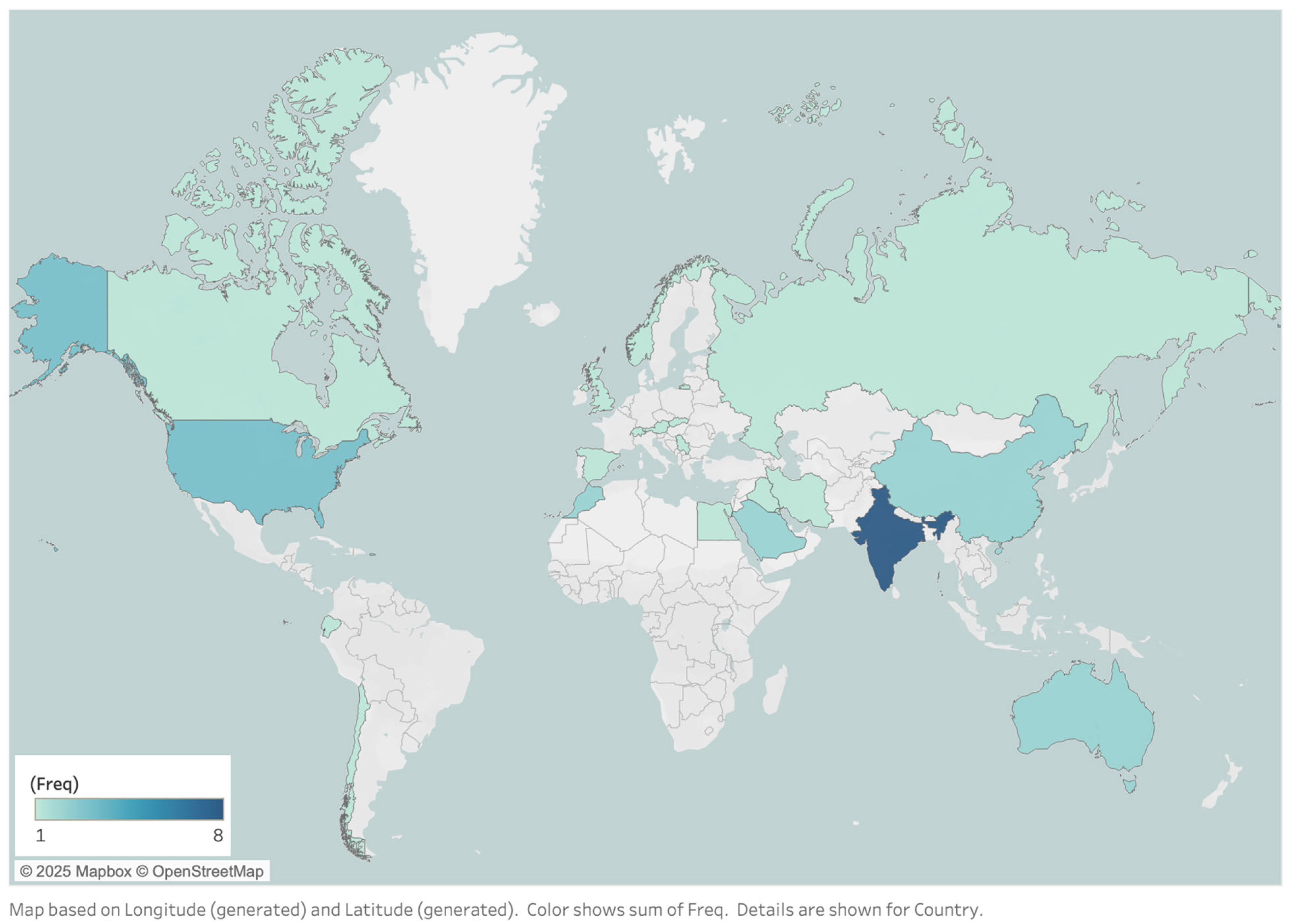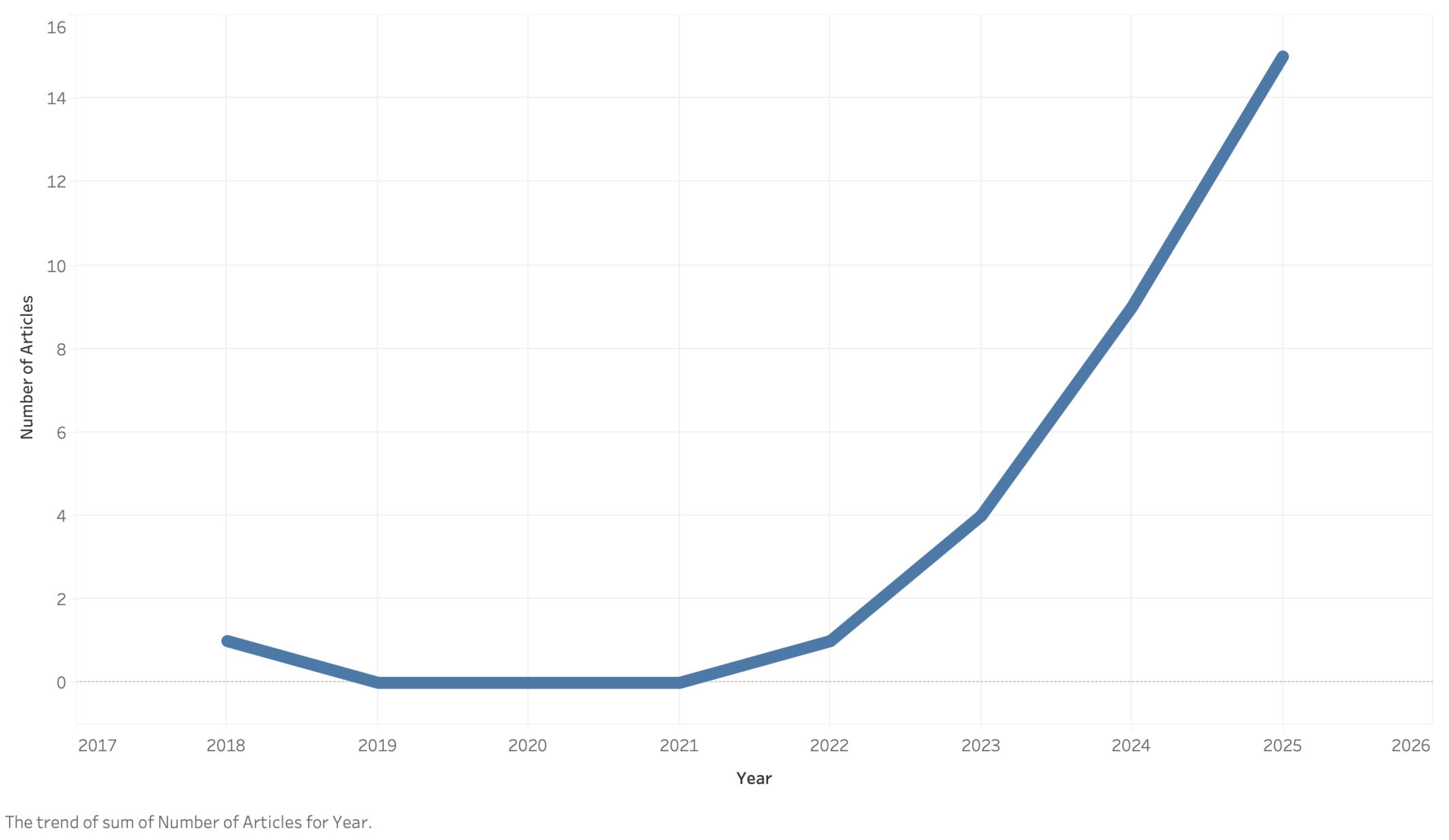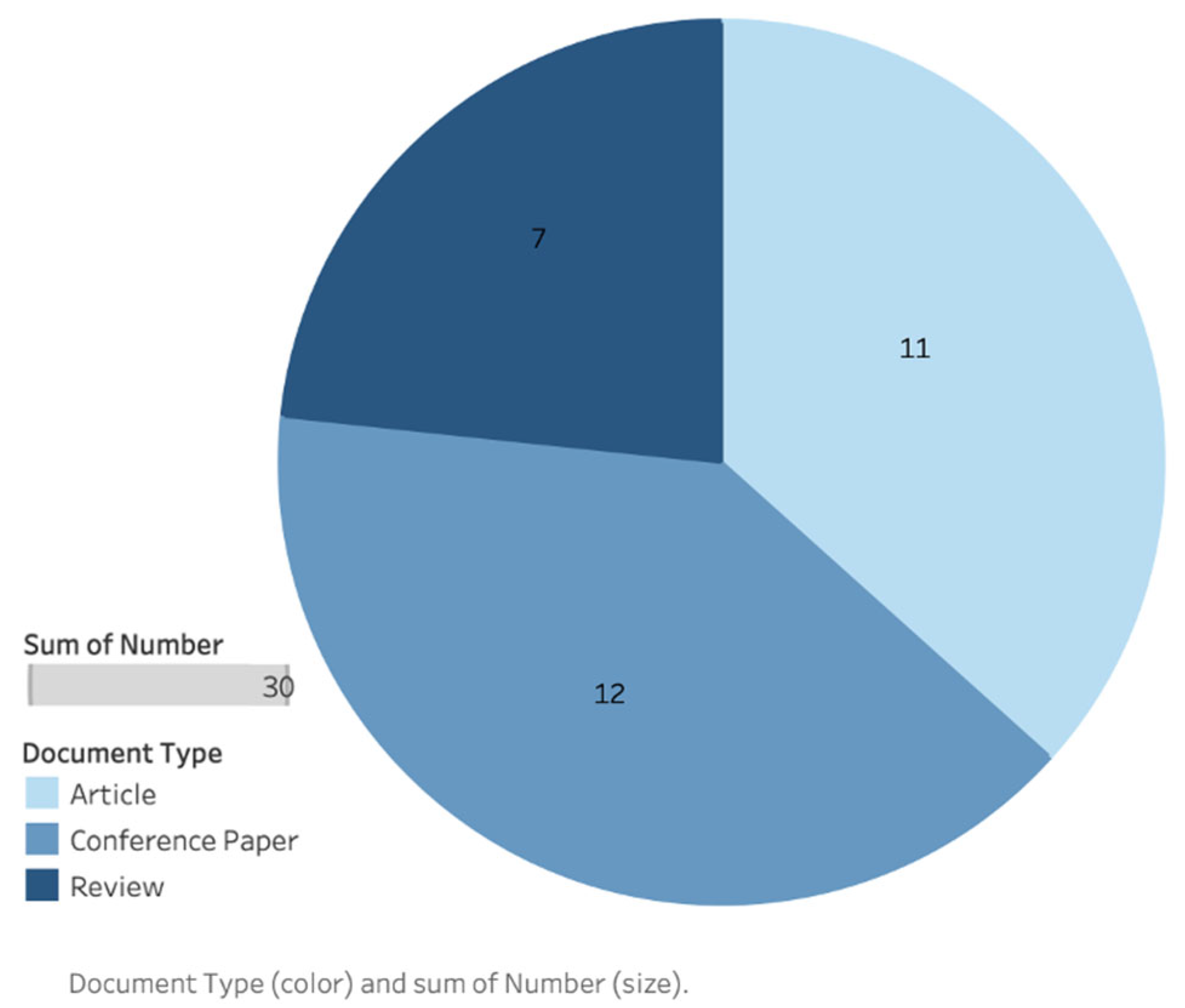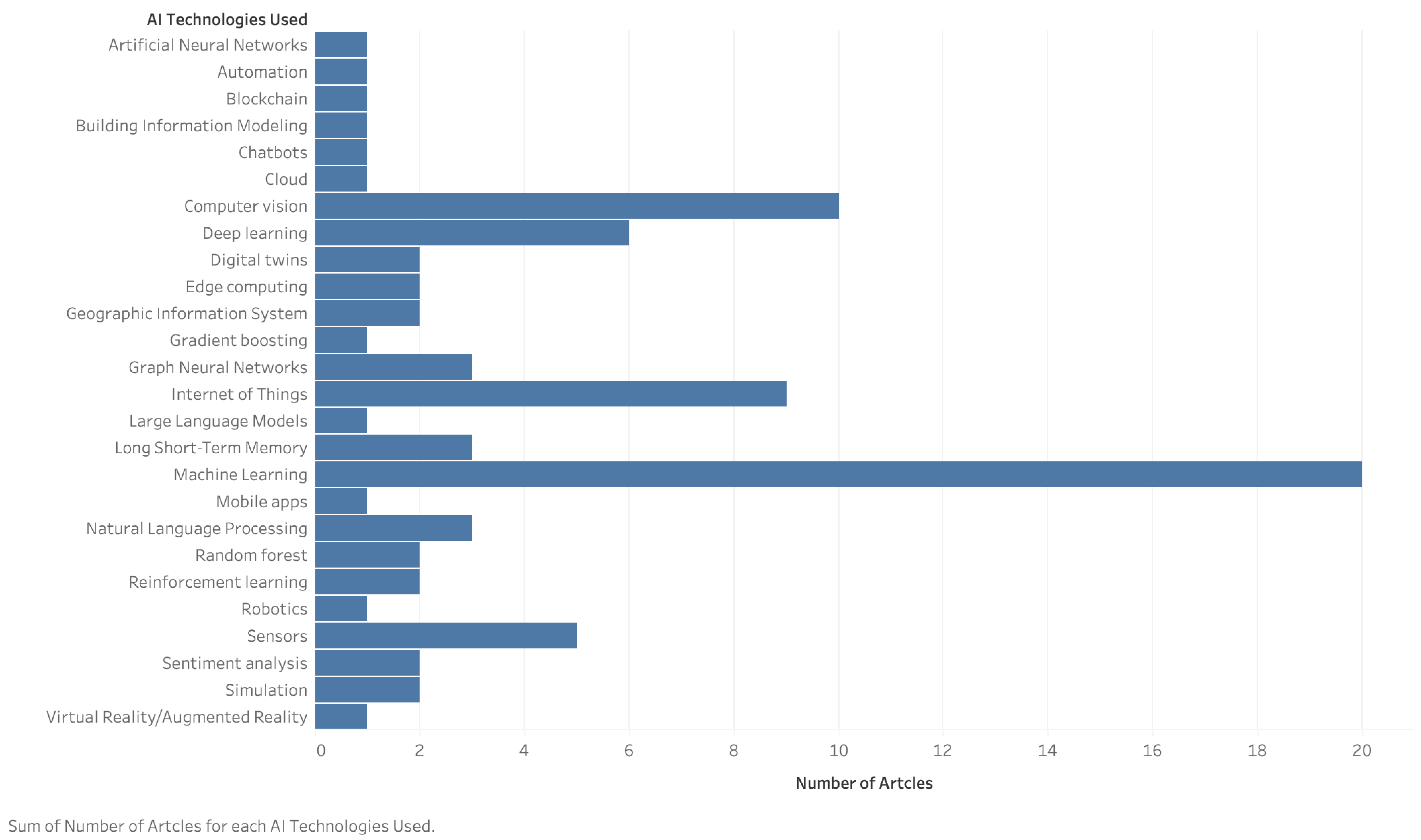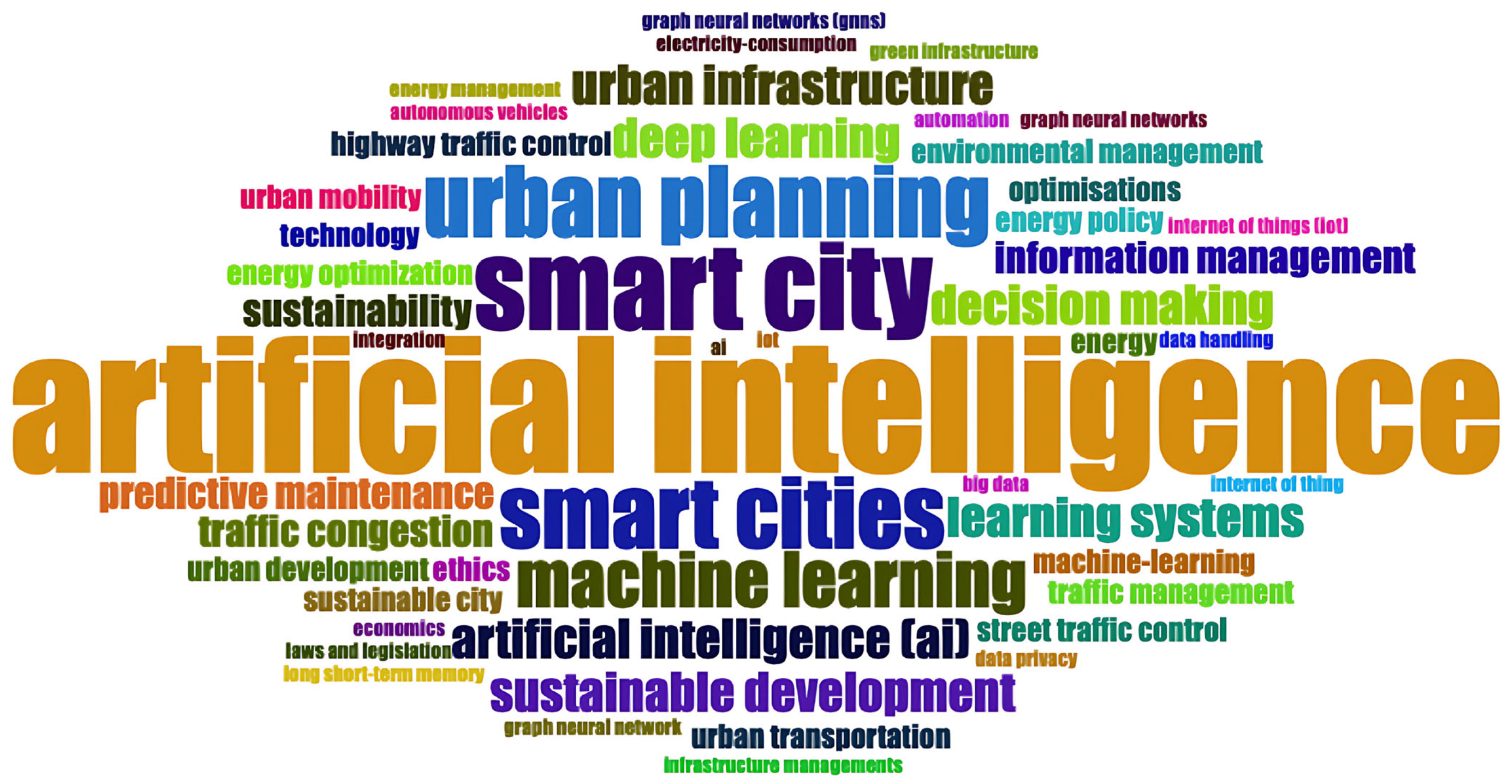Abstract
This paper systematically reviewed studies on the integration of Artificial Intelligence (AI) into infrastructure management to support sustainable urban planning across three primary domains: predictive maintenance and energy optimization, traffic and mobility systems, and public participation with ethical considerations. Findings from thirty peer-reviewed studies underscore how AI-driven models enhance operational efficiency, sustainability, and governance in smart cities. Effective management of AI-driven smart infrastructure can transform urban planning by optimizing resources efficiency and predictive maintenance, including 15% energy savings, 25–30% cost reductions, 25% congestion reduction, and 18% decrease in travel times. Similarly, participatory digital twins and citizen-centric approaches are found to enhance public participation and help address ethical issues. The findings further reveal that AI-based predictive maintenance frameworks improve system reliability, while deep learning and hybrid models achieve up to 92% accuracy in traffic forecasting. Nonetheless, obstacles to equitable implementation, including the digital divide, privacy infringements, and algorithmic bias, persist. Establishing ethical and participatory frameworks, anchored in responsible AI governance, is therefore vital to promote transparency, accountability, and inclusivity. This study demonstrates that AI-enabled smart infrastructure management strengthens urban planning by enhancing efficiency, sustainability, and social responsiveness. It concludes that achieving sustainable and socially accepted smart cities depends on striking a balance between technological innovation, ethical responsibility, and inclusive governance.
1. Introduction
Urbanization is increasing at an alarming level worldwide, exerting enormous pressure on scarce resources, infrastructure, and urban governance [1,2]. Over half of the world’s population currently resides in urban areas, which is anticipated to nearly reach 70% by 2050 [3]. This pace of urban growth is more pronounced in the Global South, where urban expansion overwhelms infrastructure development [4,5]. This rapid growth poses significant urban challenges, including pressure on existing services and sustainability concerns [6].
The impacts of urbanization can be felt through environmental and socio-economic crises. While urban areas face severe levels of pollution, traffic congestion, and resource depletion [7,8,9], socioeconomic inequalities continue to widen, leaving many urban residents without adequate access to clean water, sanitation, shelter, and healthcare [10]. The environmental toll is equally noteworthy, as urban areas contribute substantially to global greenhouse gas (GHG) emissions due to intensive energy consumption [11,12]. Also, the growing frequency of natural disasters might exacerbate these challenges, straining already fragile urban management [13].
The complexity and scale of these challenges have rendered traditional urban planning models insufficient to deliver public service, manage infrastructure, allocate resources, and protect the environment [14]. These limitations have prompted urban planners to explore innovative solutions, with Artificial Intelligence (AI) evolving as a transformative tool for addressing such multifaceted urban challenges [15].
As such, urban areas worldwide are increasingly adopting AI to revolutionize governance by enabling more adaptive, efficient, and resilient urban systems capable of addressing challenges such as resource shortages, traffic congestion, and energy inefficiencies [16,17,18]. As it receives and processes immense quantity of real-time data, AI can facilitate infrastructure management, predictive maintenance, optimize transport, and enhance energy management beyond what traditional methods can achieve [19,20]. Consequently, AI-driven infrastructure management is essential in achieving efficiency and urban sustainability [21].
Among the key advantages of AI is predictive maintenance, where algorithms analyze sensor data to anticipate system failures before they happen, thus reducing operational costs, preventing disruptions in vital services such as water, electricity, and transportation networks [20,22]. Similarly, AI-based traffic management systems can alleviate congestion by analyzing real-time traffic data and dynamically adjusting signal timings to minimize travel times and GHG emissions [23].
Also, AI plays a crucial role in urban energy optimization and sustainable energy ecosystems, where smart grids equipped with AI can balance energy supply and demand in real time, minimizing waste and integrating renewable energy sources to lower emissions, manage energy storage, and provide predictive insights into future energy needs [24]. Moreover, AI applications for citizen engagement have shown promise in improving inclusivity and accessibility, although implementation challenges persist [25,26,27].
Despite its growing interest, significant gaps remain in understanding the full transformative potential of AI in urban planning. While numerous studies explore its applications in specific areas such as traffic management and energy optimization, few comprehensively assess the broader impact of AI across interconnected infrastructure systems [28]. Questions also remain regarding how AI can be well integrated into existing urban frameworks and the barriers impeding its widespread adoption [20,29]. Ethical challenges related to data privacy, security, and transparency further complicate implementation [30]. The risk that AI could deepen existing inequalities in access to smart infrastructure, particularly in developing regions, also warrants critical investigation [31].
Similarly, resilience as the ability of urban systems to adapt, recover, and maintain functionality under stress has merged as a crucial outcome of effective AI integration [32]. Although resilience is intrinsically linked to the optimization and predictive capabilities of AI across various infrastructure systems, the literature discussed them separately [33]. This study, therefore, views resilience not as an isolated goal but as a cumulative outcome of AI-based improvements in maintenance, resource management, and mobility systems. However, ensuring that AI systems remain robust and adaptive during crises is a persistent challenge.
In participatory urban planning, AI systems can promote inclusivity and transparency, supporting data-driven and equitable decision-making [34,35]. Yet, digital divide, data privacy, ethical considerations and equitable access are major obstacles [36,37]. Addressing these concerns is crucial for ensuring that AI-driven urban innovations foster more sustainable and inclusive development.
These knowledge gaps call for a systematic review to assess the efficacy of AI-based smart infrastructure across diverse urban contexts and to identify best practices for integrating AI into planning frameworks. Accordingly, this study aims to investigate AI-driven smart infrastructure management within urban planning, focusing on three core themes: (i) predictive maintenance and resources and energy optimization; (ii) traffic and mobility management; and (iii) public participation and ethical considerations.
While proponents underscore the ability of AI technologies to optimize infrastructure, minimize inefficiencies, and enhance sustainability [16], critics caution that technological solutions alone cannot address socio-economic inequalities [30]. Moreover, ethical concerns about data privacy, algorithmic bias, and accountability demand careful attention. The present study contributes in three major ways. First, it provides a structured synthesis of technical and social dimensions of AI in urban planning. Second, it highlights ethical and equity considerations that are often overlooked in existing literature. Third, it offers practical insights to guide policymakers and urban planners in adopting AI responsibly.
To guide this review, the following research question is posed: How can AI-driven smart infrastructure management transform urban planning across the three key themes? This question anchors the exploration of the role of IA in shaping more adaptive, efficient, and inclusive urban future.
The rest of the paper is structured as follows: Section 2 outlines the conceptual framework underpinning this study, underscoring the three key themes of AI-driven smart infrastructure management. Section 3 explains the methodology and systematic review process following the PRISMA approach. Section 4 details the study’s results, followed by Section 5, which analyzes the main findings and their implications. Lastly, Section 6 wraps up the paper with core recommendations.
2. Literature Review
This section synthesizes findings from the literature review and the conceptual framework to establish a structured foundation for understanding how AI can contribute to smart infrastructure management in urban areas, which are increasingly complex and evolving due to rapid population growth. As such, AI-driven technologies are pivotal in enhancing the efficiency, sustainability, and resilience of urban infrastructure, particularly in domains such as predictive maintenance and resources optimization, traffic and mobility management, and public participation and ethical considerations [20,25]. Through the processing of massive real-time data, AI can facilitate proactive decision-making and operational efficiency, surpassing the traditional infrastructure management approach. However, the transformative potential of AI technologies extends beyond technical innovation by introducing new layers of ethical ang governance complexity, particularly in areas concerning data privacy and equitable access [30].
Predictive maintenance exemplifies AI’s ability to monitor urban infrastructure in real time, anticipate potential failures, optimize resource allocation and extend the operational lifespan of critical urban assets such as roads, bridges, utilities and energy grids [38]. Beyond proactive maintenance, studies demonstrate substantial improvements in urban efficiency. Machine learning, IoT, and smart grid technologies have achieved remarkable results, including 15% energy savings equivalent to 1.6 TWh annually, while investments of $1.2 billion have prevented $3.7 billion in flood damages [37]. Advanced forecasting models using neural networks and gradient boosting have reached coefficient of determination values of 0.9835, optimizing 1.09 million kWh of electricity consumption [39]. Infrastructure maintenance has been revolutionized through AI applications, with studies reporting 30% faster response times, 25% productivity gains, and 92% accuracy in predictive maintenance systems [40,41].
Traffic management, on the other hand, involves AI-driven systems that optimize urban mobility through real-time data analysis, reducing congestion, travel times, and emissions [23]. Traffic and mobility management applications showcase equally impressive outcomes. Deep learning and computer vision techniques have reduced traffic congestion by up to 25% and decreased travel times by 18% [42]. Predictive accuracy for traffic management and accident detection consistently exceeds 90%, with some studies achieving 98% accuracy in vehicle detection systems [43,44].
Public participation refers to citizens’ involvement in urban decision-making processes, whereas ethical consideration denotes the attention to ethical issues such as data privacy, algorithmic bias, and equitable access. However, these technological advances raise critical ethical and participatory concerns. Studies emphasize the importance of addressing digital divides, algorithmic bias, and privacy protection through participatory digital twins and inclusive design approaches [26,45]. This comprehensive body of research demonstrates that AI-driven smart infrastructure can enhance urban planning by creating more efficient, sustainable, and socially responsive urban environments. In the context of AI-driven infrastructure management, these aspects emphasize not only how digital and AI-enabled platforms can support more inclusive participation, but also the broader transformative potential and risks of AI in urban settings [38,46].
Conceptual Framework of AI-Driven Smart Infrastructure Management
A conceptual framework (Figure 1) was developed to visualize the interconnected domains, challenges, and sustainability goals of AI-driven smart infrastructure management. The framework centers on three key domains through which AI technologies are transforming urban systems: (1) predictive maintenance and resource optimization, (2) traffic and mobility management, and (3) public participation and ethical considerations. Each domain is linked to cross-cutting challenges, including data privacy, algorithmic bias, and equitable access, while contributing to sustainability outcomes like resource efficiency, decarbonization, and resilience [20,47].
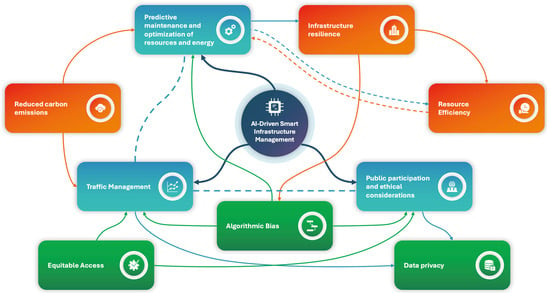
Figure 1.
Conceptual Framework of AI-Driven Smart Infrastructure Management.
In the framework, the solid arrows represent direct, unidirectional relationships between specific domains and their corresponding sustainability goals, whereas the dotted lines denote interdependencies without fixed directional flow. These interconnections emphasize that these three domains are interconnected, with advancements in one domain influencing and supporting others. For example, predictive maintenance fosters infrastructure reliability, which in turn enhances traffic flow and contributes to optimal resource use. Also, optimized resource systems can help reduce operational strains on infrastructure, bolstering predictive maintenance efforts.
Likewise, AI-driven traffic and mobility management systems, including adaptive traffic signals and real-time congestion prediction tools can enhance urban mobility while simultaneously reducing carbon emissions, thereby strengthening both resource efficiency and infrastructure reliability [48,49]. In parallel, AI-supported public participation platforms, such as digital feedback systems and participatory decision-making dashboards, foster transparency and public trust, ensuring that infrastructure solutions are responsive to community needs. Addressing ethical dimensions, such as addressing algorithmic bias and equitable access to AI-enabled services, is vital in ensuring that the integration of AI into infrastructure management advances fairness and inclusivity [38,50]. Furthermore, the solid arrows within the framework illustrate the direct relationship among the three domains and broader sustainability outcomes, including resource efficiency, reduced carbon emissions, and infrastructure resilience, demonstrating how progress in each domain collectively contributes to achieving these broader goals.
Table 1 below offers a detailed breakdown of each domain, including key AI applications, their specific impacts on urban systems, and the challenges encountered. The table outlines how AI is applied in urban infrastructure, providing a more detailed view of how each domain contributes to the overall transformation of urban environments.

Table 1.
Scope of AI-Driven Smart Infrastructure Management.
3. Materials and Methods
The present study conducted a systematic review of literature on AI-driven smart infrastructure management. The protocol was designed based on the procedures recommended by Kitchenham and Charters [53] and following the Preferred Reporting Items for Systematic Reviews and Meta-Analyses (PRISMA) guidelines, ensuring a rigorous and transparent review process [54]. The Scopus database was selected for this review due to its wide coverage of research related to AI, urban planning, and infrastructure management. This database provides a broad scope of peer-reviewed articles, ensuring the inclusion of interdisciplinary studies spanning fields such as computer science, engineering, and urban studies. Additionally, gray literature, including government reports and industry white papers, was considered to complement academic sources with insights from real-world applications of AI technologies.
The search strategy captured both the technical and applied dimensions of AI in urban infrastructure. To refine the scope and ensure a thorough but focused retrieval of studies, a carefully constructed set of search terms was used. These included combinations of key terms such as “artificial intelligence” and “AI”, paired with terms like “smart infrastructure”, “urban infrastructure”, “predictive maintenance”, “traffic management”, “energy optimization.”, “public participation” and “ethical considerations”. These search terms were applied using Boolean operators (AND, OR) to refine the search results and guarantee the inclusion of studies specifically focused on the intersection of AI and urban infrastructure. The complete search strategies are presented in Appendix A. The inclusion of articles up to 2025 ensures the review incorporates the most current research and developments in AI-driven infrastructure. To ensure a global perspective, no geographical limitations were applied. The inclusion criteria were designed to focus on studies that directly addressed the key areas of AI-driven smart infrastructure management as presented in Table 2.

Table 2.
Inclusion and Exclusion Criteria.
The literature selection process followed a multi-stage approach to ensure that the review included only papers that are high-quality, and most related to the topic. Initially, the downloaded files were exported to Zotero (Version 6.0.27), where duplicates were merged and the titles and abstracts of the studies were screened to remove irrelevant or out-of-scope articles. This initial stage helped filter out papers that did not meet the basic criteria for inclusion, such as those focused on unrelated technologies or non-urban applications of AI.
After the initial screening, the full texts of the remaining studies were comprehensively reviewed to evaluate their significance to the research objectives. At this stage, studies were evaluated according to the depth of their analysis, their contribution to the understanding of the role of AI in urban infrastructure management, and whether they provided empirical or case-based evidence. Studies that passed this stage were further categorized into themes based on their primary focus area predictive maintenance and optimization of resources and energy, traffic and mobility management, and public participation with ethical considerations.
To safeguard transparency and replicability, the entire process was conducted by two reviewers, who independently assessed the studies and cross-checked the results. Disagreements between reviewers were addressed through dialogue, and when needed, a third reviewer was consulted to help achieve consensus. The selection process is subject to certain limitations. First, the review included only English-language publications, excluding papers in other languages. Second, the search was limited to Scopus, the largest academic database.
The initial search across databases yielded a total of 473 studies. Titles and abstracts of the studies were evaluated for relevance according to the predetermined inclusion and exclusion criteria Following the abstract screening, a total of 177 studies were selected for full-text review. During this phase, each study was carefully examined to determine its relevance to the research objectives, with a particular focus on empirical evidence or case-based analysis. Studies that were primarily theoretical, lacked practical application, or did not directly address the transformative impact of AI on urban infrastructure were excluded. Two studies were unavailable for retrieval, leaving 30 studies that fulfilled all inclusion criteria and were included in the final synthesis. The completed PRISMA flow diagram (Figure 2) visually illustrates the study selection process, showing the number of studies identified, assessed, and ultimately included at each stage.
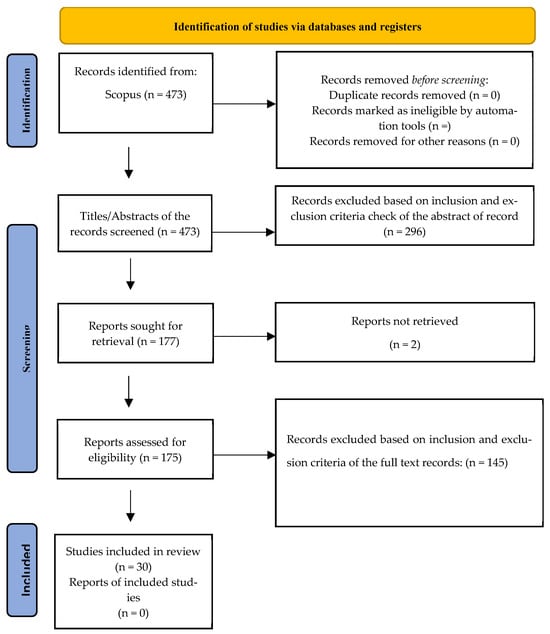
Figure 2.
PRISMA framework for analysis.
To systematically evaluate the papers included in the review, a structured data extraction process was employed. A standardized data extraction template was developed, ensuring consistency and rigor across all selected studies. This template captured critical information, including the study objectives, the specific AI technologies or algorithms applied, the methodological approaches used, and the key results linked with the impact of AI on urban infrastructure. Also, the template included sections for identifying barriers to AI implementation, and other ethical considerations discussed. Each study’s contents were meticulously reviewed and extracted, highlighting how AI technologies are being utilized in various domains.
After data extraction, a narrative synthesis approach was employed to organize and interpret the findings. Studies were thematically grouped according to the three focal domains, which are predictive maintenance and resource optimization, traffic and mobility management, and public participation with ethical considerations. Through qualitative analysis, common patterns and trends were identified, offering critical insights into AI’s transformative potential in reshaping urban infrastructure management.
In addition to evaluating technological impacts, the synthesis also included an analysis of the ethical and social challenges of AI deployment in urban settings. This involved reviewing how AI technologies affect issues like data privacy, algorithmic transparency, and equitable access to infrastructure services. By considering these broader implications, the review provides an all-inclusive assessment of how AI can be efficiently integrated into urban systems while addressing potential risks and disparities. The narrative synthesis process helped to collate a wide range of evidence into cohesive themes, providing a detailed insight about the present state of AI-driven infrastructure management and underscoring fields for future research and development.
4. Results
4.1. Summary of Findings
The descriptive analysis covered 30 selected studies, classified based on geographical distribution, publication year, study type, research approach, and AI technologies utilized. This categorization offers a comprehensive overview of the existing research landscape on AI-driven smart infrastructure management within the context of urban planning. The geographical analysis of the reviewed studies reveals a notable regional imbalance. Most research originates from Asia, with India contributing the highest number of studies. This is followed by moderate representation from Europe and North America. The Middle East and Oceania also show some presence, while contributions from Africa and South America remain limited. This uneven spatial distribution highlights the dominance of technologically advanced regions in AI-driven urban planning research and underscores the need for more inclusive, cross-regional collaboration to ensure equitable knowledge production and application in sustainable urban development. (Figure 3).
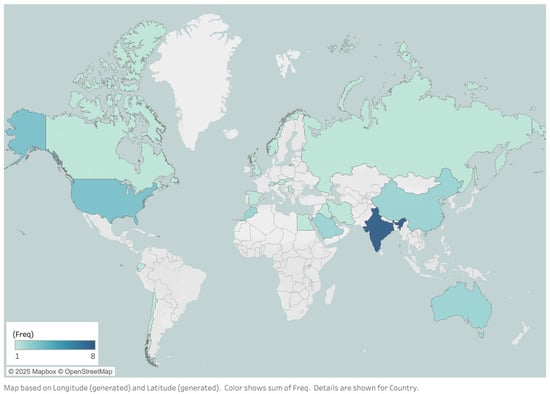
Figure 3.
Geographical distribution of reviewed studies.
Similarly, the temporal distribution of the reviewed studies (Figure 4) indicates a clear upward trend in research activity on AI-driven urban infrastructure management. While only isolated studies appeared in 2018 and 2022, publications have grown rapidly since 2023, peaking in 2025 with fifteen studies. This sharp increase reflects the growing academic and practical interest in applying artificial intelligence to sustainable smart infrastructure management for urban planning, particularly following global policy initiatives emphasizing digital transformation and sustainability.
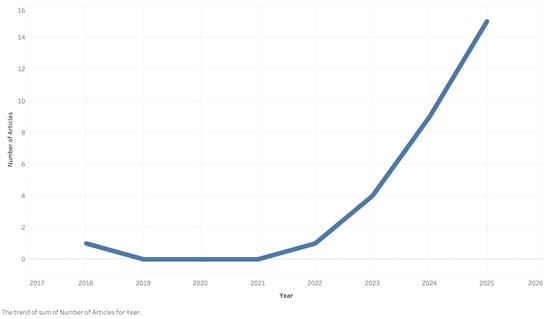
Figure 4.
Number of studies published per year.
The reviewed literature comprises studies categorized into three main document types: 12 conference papers, 11 journal articles, and 7 review papers (Figure 5). Conference papers represent the largest share, reflecting the rapidly evolving and experimental nature of AI applications in urban infrastructure research. The analysis of research approaches reveals that quantitative methods dominate the reviewed studies (10 articles), followed by qualitative (7) and conceptual frameworks (6). Mixed-methods designs (4) and case studies (3) are less common but provide valuable contextual insights. This distribution suggests a strong preference for data-driven and computational approaches in AI-based urban infrastructure research, reflecting the field’s emphasis on measurable performance outcomes (Figure 6).
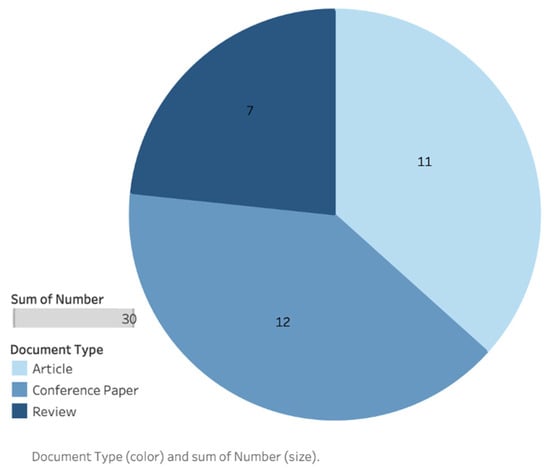
Figure 5.
Document type distribution of the reviewed studies.

Figure 6.
Research approaches adopted across the reviewed studies.
The analysis of AI technologies shows that machine learning dominates the reviewed studies (20 articles), followed by computer vision (10) and the Internet of Things (9). Deep learning (6), sensors (5), and natural language processing (3) are also frequently applied. Other technologies, such as digital twins, reinforcement learning, and graph neural networks, appear in a smaller number of studies (Figure 7). This distribution indicates that the field remains primarily driven by data-centric and sensor-based approaches, while emerging technologies such as large language models, blockchain, and VR/AR are beginning to gain attention in the context of urban infrastructure management.
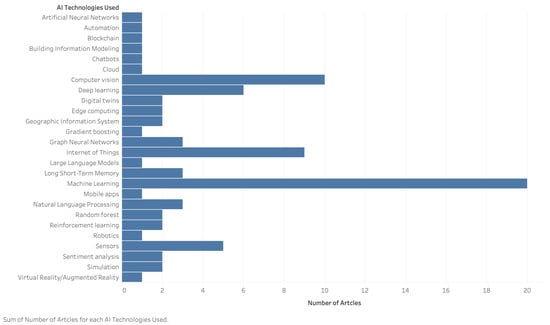
Figure 7.
AI technologies across the reviewed studies.
To conclude the descriptive analysis, the word cloud visualization (Figure 8) offers an overview of the most recurrent concepts and themes identified across the thirty reviewed studies, offering a concise visual synthesis of AI-driven urban planning research. The most prominent terms such as artificial intelligence, smart city, urban planning, and sustainability reflect the crucial focus of the literature on integrating AI into urban infrastructure. These terms align directly with the three analytical themes identified in this review: (1) predictive maintenance and energy optimization, (2) traffic and mobility systems, and (3) public participation with ethical considerations. The visualization highlights the multidimensional nature of AI applications in urban contexts, encompassing technical efficiency, sustainable infrastructure, and inclusive governance.
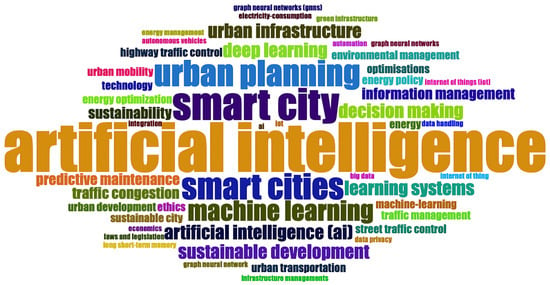
Figure 8.
Key topics addressed in the paper.
Accordingly, the thirty selected studies on smart infrastructure management for urban planning were categorized into three thematic areas, with ten studies contributing to each. The detailed findings of these thematic clusters are examined in the following sections. It is worth noticing that while the research papers were grouped under these three main categories, several studies overlap across multiple themes, reflecting the interdisciplinary nature of AI applications in urban planning.
4.2. Predictive Maintenance and Optimization of Resources and Energy
This section synthesizes findings from ten studies that examined how (AI) predictive maintenance and energy optimization, as identified across included in this review. These studies explore and machine learning (ML) improve the efficiency, reliability, and sustainability of urban infrastructure systems. The results emphasize the growing role of AI in optimizing maintenance operations, reducing energy consumption, and supporting data-driven decision-making for smart and resilient cities. Advanced computer vision techniques, particularly YOLOv9, show promise for automated road defect detection and maintenance planning [40]. Machine learning approaches achieve impressive performance metrics, with Random Forest, LSTM, and Gradient Boosting algorithms reaching up to 92% accuracy in predictive maintenance applications, while reducing costs by over 30% with an increase of 25% in uptime of operations [41].
Energy optimization represents a critical application domain, with sophisticated forecasting models achieving high precision in urban energy management [39]. Street lighting infrastructure benefits from advanced temporal modeling, where Temporal Fusion Transformers (TFT) outperform other approaches in predictive accuracy [55]. Machine learning models play a central role in achieving these optimizations. These algorithms have shown strong capabilities in capturing complex patterns in energy consumption data, supporting accurate forecasting and efficient energy distribution [39]. The TFT further enhances these outcomes by integrating contextual and temporal information to predict system faults with higher precision [55]. Similarly, predictive models for energy devices achieve notable accuracy levels, reaching about 87% in identifying potential failures up to two weeks in advance [56].
Smart grid integration emerges as a transformative application, with AI and 5G technologies enabling comprehensive energy system optimization [57]. Similarly, hydrogen energy systems particularly benefit from deep learning approaches for grid management [55]. Environmental sustainability gains prominence through AI-driven systems achieving 15–20% energy savings in cities like Amsterdam and Singapore [58]. Broader applications demonstrate substantial impact, with reported 40% energy reductions in data centers and 20% waste cost reductions [51].
The economic impact of these integrated systems extends beyond immediate cost savings. Cities implementing AI-driven predictive maintenance report a 35% increase in maintenance efficiency through reduced downtime and optimized resource allocation [41]. Furthermore, these systems contribute to broader sustainability goals by reducing carbon emissions through improved energy utilization [55] and supporting long-term energy sustainability [57]. Collectively, the evidence indicates that predictive maintenance and resource optimization operate as interconnected components within comprehensive smart city ecosystems, driving both economic efficiency and environmental resilience.
Citizen engagement through macro-scale digital twins has emerged as an innovative approach to infrastructure governance, collecting stakeholder feedback and utilizing segmentation and classification algorithms to support participatory management and infrastructure maintenance [35]. However, significant challenges persist, including ethical considerations, data privacy concerns, and IoT integration complexities in urban planning contexts. Despite these challenges, the collective evidence suggests that AI-driven infrastructure management can fundamentally shift urban systems from reactive to proactive approaches, enabling more efficient resource utilization and sustainable urban development.
Generally, this review demonstrates that AI-driven predictive maintenance and energy optimization frameworks are significantly reforming the monitoring, management, and sustainability of urban infrastructure systems. By combining advanced forecasting, computer vision, and deep learning models, these applications have proven their capacity to reduce operational costs, extend asset lifecycles, and enhance environmental efficiency. Table 3 below presents themes represented in the quoted studies regarding predictive maintenance.

Table 3.
Predictive maintenance and optimization of resources and energy.
4.3. Traffic and Mobility Management
This section presents the main findings across the ten including studies, AI and machine learning (ML) applications demonstrate substantial progress in advancing intelligent traffic management and sustainable urban mobility. AI-driven prediction and detection models show consistently high performance in traffic forecasting and incident identification. Deep learning and hybrid frameworks achieved average prediction accuracies of 91.3% and 92% [44,52], while edge-deployed detection systems reported mean average precision of 87% and F1 scores of 80% for accident identification [60]. Likewise, YOLO-based vehicle detection and counting systems have attained 95% precision and notable efficiency gains using inexpensive edge computing methods [43]. These studies underline AI’s role in facilitating granular, adaptive, and data-driven traffic management processes.
Complementary research emphasizes AI’s capacity for real-time optimization of urban traffic systems. Graph Neural Network and Simulated Annealing approaches reduced congestion by 25% and travel times by 18% [42], while solar-powered, IoT-integrated systems achieved a 17.2% reduction in waiting times, 22.5% improvement in emergency response, and a 15.8% decrease in carbon monoxide emissions at costs below USD 3000 [61]. Continuous routing optimization frameworks and adaptive ML models further enhance operational efficiency [44,62], reflecting a shift from reactive to proactive urban management paradigms.
Sustainability and social integration also emerge as central themes. Studies on smart infrastructure report environmental benefits and improved public engagement through multimodal systems, digital twins, and renewable energy integration [34,62]. Participatory and ethical approaches achieved up to 77.9% citizen approval and a 30% reduction in traffic offenses [63], which underscores the role of transparency and inclusiveness.
However, eight studies consistently identify barriers to large-scale implementation, including data quality, interoperability, computational demands, stakeholder resistance, and governance complexity [60,61]. Resource limitations, privacy concerns, and contextual variability further constrain generalizability. While AI-based traffic and mobility systems show transformative potential, widespread adoption requires integration of technological innovation with institutional readiness and societal trust. Table 4 below presents themes represented in the quoted studies regarding traffic and mobility management.

Table 4.
Traffic and mobility management.
4.4. Public Participation and Ethical Considerations
This analysis of ten studies reveals critical insights into how public participation and ethical frameworks shape AI implementation in urban planning, highlighting both opportunities and persistent challenges. Digital platforms consistently emerge as key enablers of community engagement. Generative AI applications demonstrate promise, automating visualization to lower participation barriers and improve engagement, especially for disengaged groups [27]. Digital agents and chatbots enhance stakeholder engagement, with a specific focus on inclusivity for older adults [65]. However, studies reveal significant variation in approaches, with collaborative models in Helsinki and Copenhagen contrasting sharply with more technocratic implementations in Dubai and Tokyo [25].
Privacy is increasingly becoming the most cited ethical concern across the reviewed literature [25,66], followed by transparency [36,67] and accountability [67,68]. Regulatory frameworks, like the AI Act by the European Union, offer governance benchmarks, while participatory design processes explicitly address equity concerns and counteract green gentrification [37]. Studies emphasize combining traditional ethical principles with AI-specific considerations like explainability [65].
Despite positive outcomes in engagement and inclusiveness, persistent barriers include the digital divide, algorithmic bias, and regulatory gaps [37]. Critical gaps emerge between theory and practice, as demonstrated by Vienna’s traffic system improving efficiency while failing to address visually impaired users’ needs [45]. Studies consistently call for robust frameworks ensuring transparency, ongoing oversight, and balancing digital with traditional participation methods to prevent exclusion of marginalized groups [25]. As a result, these findings suggest that AI can democratize urban governance when ethical, transparent, and participatory frameworks are institutionalized alongside technological innovation. Table 5 below represents themes of publication, participation and decision-making.

Table 5.
Public participation and ethical considerations.
Table 6 summarizes the key benefits and challenges of AI-driven smart infrastructure management across the three thematic domains of this review: predictive maintenance and resource/energy optimization, traffic and mobility management, and public participation with ethical considerations. While each domain demonstrates substantial potential for improving efficiency, sustainability, and inclusiveness, the analysis also highlights recurring barriers such as data quality issues, integration with legacy systems, and ethical concerns.

Table 6.
Summary of Key Benefits and Challenges of AI-Driven Smart Infrastructure Management.
5. Discussion
5.1. Synthesis for the Findings
This study has examined the role of AI in advancing sustainable urban infrastructure across three key domains: predictive maintenance and resource optimization, traffic and mobility management, and public participation with ethical considerations. The evidence across the reviewed studies indicates that AI plays a pivotal role in improving the reliability, efficiency, and resilience of urban systems. In the context of predictive maintenance, AI applications can help anticipate infrastructure failures and reduce operational disruptions, achieving cost savings of up to 30% in urban transportation and other public infrastructure sectors [69]. Consistent findings across multiple studies highlight AI’s contribution in enhancing service continuity and reducing maintenance burdens in high-density urban environments [38,70,71].
The synthesis of findings from the reviewed studies indicates that AI-driven smart infrastructure management is reshaping urban planning by enabling predictive maintenance and energy optimization. While most studies converge on the effectiveness of AI in enhancing efficiency and sustainability, they differ in methodological focus and application domains. Deep learning and ensemble algorithms, including LSTM networks, Random Forest, and Gradient Boosting, demonstrate superior performance in predictive maintenance [41]. Similarly, computer vision approaches such as YOLOv9 automate road defect detection with high precision [40], and Temporal Fusion Transformers outperform other temporal models in optimizing street lighting [55].
Comparatively, energy optimization studies emphasize broader system-level transformations. Forecasting frameworks achieved high accuracy in urban energy prediction [39], while practical implementations demonstrate measurable energy savings in cities such as Amsterdam and Singapore [58]. AI-driven systems further report efficiency improvements in data centers [52] and successful integration of 5G-enabled smart grids [57] and hydrogen energy systems [55]. These studies collectively show that while technical models achieve strong predictive accuracy, their success varies depending on data quality, contextual adaptability, and infrastructure readiness.
From an economic perspective, AI-driven predictive maintenance systems show tangible returns, with cities achieving around 30% reductions in maintenance costs and 25–35% improvements in operational uptime due to automated fault detection and optimized scheduling [41]. These results suggest that predictive maintenance and energy optimization operate as interdependent systems that reinforce both economic efficiency and environmental resilience. Environmentally, AI-enabled frameworks contribute to sustainability goals through reductions in carbon emissions and improved energy utilization efficiency [55,57], positioning these technologies as key drivers of responsible urban growth.
In contrast, social and participatory frameworks, such as citizen-centric digital twins, emphasize governance transparency and citizen engagement by positioning residents at the core of infrastructure decision-making. These systems employ real-time feedback mechanisms, including volunteered geographic information and social sensing, to strengthen collaboration and accountability [35]. However, persistent challenges remain, particularly in data interoperability, the absence of comprehensive ethical frameworks, and the environmental impacts of AI systems related to energy consumption and electronic waste generation [58]. Across several studies, recurring barriers include data interoperability, IoT integration challenges, and ethical or regulatory uncertainties [57,58]. In general, these converging findings highlight both the technological maturity and the socio-technical challenges of AI-based infrastructure management, setting the foundation for the discussion that follows on how these systems can be more effectively and ethically integrated into sustainable urban development.
Building on these insights into predictive maintenance and energy optimization, the discussion now turns to the application of AI in transportation and mobility systems, where similar data-driven principles are reshaping urban efficiency and sustainability. AI-driven smart infrastructure management is transforming urban planning by revolutionizing traffic and mobility systems through data-driven optimization and predictive analytics. The findings of this review reveal that artificial intelligence (AI) has become a pivotal enabler of sustainable and intelligent urban mobility. The synthesis of the ten reviewed studies collectively in Table 5 demonstrate that AI-driven systems can substantially improve traffic prediction, congestion management, and environmental performance [42,52,72]. Deep learning and hybrid models such as LSTM, RBF, YOLOv3, and GNN-based frameworks consistently outperformed traditional analytical methods, achieving high predictive accuracy and operational efficiency [44,60]. These results align with previous findings emphasize that data-driven and adaptive systems transform urban transport from reactive control to proactive optimization [61,62].
However, the discussion extends beyond technical efficiency. Persistent implementation barriers such as data quality, interoperability, scalability, and governance complexity indicate that technological readiness alone is insufficient for systemic transformation [34,42]. Similarly to findings in broader smart city research, these constraints reflect the need for institutional capacity building and stronger stakeholder engagement to ensure real-world adoption of AI systems [63]. Similarly, ethical and societal dimensions are equally critical. Studies such as Saleh [64] and Vasilieva et al. [63] report public concerns regarding privacy, fairness, and autonomy, illustrating that social acceptance is essential to sustaining innovation. The proposed cyclic framework for ethical AI governance [64] and participatory design approaches [63] collectively point toward an emerging paradigm of “responsible AI urbanism,” which balances technological efficiency with societal well-being.
While advancements in AI-driven mobility demonstrate the potential for efficiency and safety, broader ethical and participatory dimensions remain central to ensuring that such technological progress aligns with social values and inclusive governance. This synthesis reveals both convergent ethical priorities and divergent participatory approaches across all reviewed studies, highlighting the complex relationship between technological innovation and democratic governance in AI-driven urban planning. Studies demonstrate remarkable consistency in ethical priorities, with privacy emerging as the predominant concern [25,36,37], followed by transparency [65,67], and accountability [67]. This consistency suggests universal recognition of core democratic values in AI governance, regardless of geographic or cultural context.
Geographic variations reveal fundamentally different approaches to public engagement. European studies emphasize collaborative, inclusive models with community oversight boards and participatory review processes [25,45] while Asian implementations adopt more efficiency-focused approaches with structured equity assessments [37]. North American studies bridge these approaches, combining digital innovation with traditional democratic principles [65].
All reviewed studies have acknowledged the potential of digital platforms in enhancing engagement through real-time feedback, generative AI visualization, and mobile applications [27,65]. However, studies consistently identify the digital divide as a critical barrier, with marginalized groups facing exclusion [25]. This creates a fundamental tension between technological advancement and inclusive participation. Studies reveal persistent disconnection between ethical frameworks and practical outcomes. While regulatory frameworks for responsible technology use provide governance benchmarks, implementation failures such as Vienna’s traffic system neglecting visually impaired users demonstrate the challenge of translating ethical principles into equitable practice across diverse urban contexts [45]. These insights highlight that ethical and participatory frameworks are not secondary considerations but foundational to the legitimacy and long-term sustainability of AI-driven urban governance.
As a result, the three thematic areas predictive maintenance and energy optimization, AI-driven mobility, and public participation with ethical considerations illustrate that the success of AI in urban governance depends not only on technical efficiency but also on social legitimacy. Sustainable smart cities require aligning technological innovation with ethical accountability, transparency, and inclusive participation to ensure that digital transformation serves both urban efficiency and human well-being.
5.2. Technical and Ethical Challenges in AI Implementation
Despite its advantages, AI integration in urban infrastructure faces several technical and ethical challenges. One major barrier is the complexity of integrating AI with legacy infrastructure, especially in cities with systems that lack digital compatibility [25,72]. As this study observed, cities in emerging markets are particularly constrained by limited computational resources and aging infrastructure, which complicates the adoption of AI-driven solutions [40]. Scalability also presents challenges. High-density cities, even with robust digital frameworks, must process vast quantities of real-time data, posing a significant computational burden [60]. Consistent performance across diverse urban settings requires scalable AI systems, but high implementation costs and integration complexities remain obstacles [41].
Ethical concerns, such as privacy, algorithmic fairness, and the digital divide, further complicate AI’s deployment in urban systems [37]. With AI systems handling sensitive public data, it is crucial to ensure transparency and maintain data security. Algorithmic bias and socio-economic disparities can also impact equitable access to AI-driven resources, risking the potential exclusion of marginalized communities. Ensuring that AI applications in urban planning are inclusive and accountable is essential for achieving fair, sustainable urban growth [73,74]. A critical challenge lies in balancing the efficiency gains of AI with broader equity concerns.
While AI-driven optimization can significantly improve traffic flow, energy distribution, and resource allocation, it also risks deepening socio-economic divides if access remains unequal or if algorithmic bias persists. These ethical trade-offs underscore the tension between maximizing operational performance and ensuring fair, inclusive outcomes, highlighting the need for transparency, fairness, and accountability in AI system design [75]. Scholars further emphasize that urban automation often prioritizes efficiency while marginalizing vulnerable groups, reinforcing the importance of ethical safeguards [76]. Several studies call for ethical frameworks that explicitly integrate fairness, transparency, and inclusiveness into AI-enabled systems, ensuring that efficiency gains do not come at the expense of equity [77].
5.3. Implications for Sustainable Urban Development
The integration of AI-driven smart infrastructure management presents transformative implications for sustainable urban development, demonstrating how technology can address multiple sustainability challenges simultaneously. The reviewed studies reveal that AI implementation generates cascading sustainability benefits across environmental, economic, and social dimensions, directly supporting the Sustainable Development Goals (SDGs).
Environmental sustainability emerges as the most quantifiable benefit, aligning with SDG 7 and SDG 13. Energy optimization systems achieve 15–20% reductions in consumption, potentially preventing billions in climate-related damages [37,58]. Similarly, AI-enabled traffic management systems contribute to SDG 11 by reducing emissions by 21–25% and improving urban mobility [51]. The convergence of predictive maintenance and resource optimization extends infrastructure lifecycles up to 100 years, reducing construction-related environmental impacts and resource waste [40].
Economic sustainability aligns with SDG 8 and SDG 9 through cost reductions and improved resource efficiency. Maintenance cost decreases of 25–30%, coupled with energy savings equivalent to 1.6 TWh annually, illustrate how AI fosters economically viable pathways to sustainability [37,41]. These economic benefits can enable reinvestment in further sustainable infrastructure development, creating positive feedback loops for urban transformation.
Social sustainability contributes to SDG 10 and SDG 16 by emphasizing equity, inclusivity, and ethical governance. Despite challenges related to digital access and participation [45], participatory AI approaches and citizen-centric digital twins promote transparent, inclusive decision-making and help bridge digital divides [35].
As a result, these implications caution that achieving SDG 11 requires integrating technological innovation with ethical governance and inclusive design. AI-driven urban systems can thus serve as powerful instruments for advancing global sustainability agendas that are environmentally resilient, economically viable, and socially just.
6. Conclusions
This study reviewed thirty relevant literatures on the transformative potential of AI in urban infrastructure management, across the three domains of predictive maintenance and optimization of resources and energy, traffic and mobility management, and public participation with ethical considerations. AI generates interdependent benefits that strengthen overall urban functionality beyond improving efficiency within each domain. However, challenges such as legacy system integration, scalability, and ethical concerns exist, highlight the need for context-sensitive and well-governed implementations. Based on the findings of this study, implications are drawn, and practical recommendations are offered to guide policymakers, practitioners, and researchers in shaping responsible AI adoption for sustainable urban futures.
For practitioners, the findings suggest that AI can be policy-driven and strategically deployed to reduce operational disruptions, optimize mobility, and foster community participation, but its success depends on strong governance and ethical safeguards. Policymakers should prioritize participatory platforms, interoperable systems, and transparent governance frameworks, while ensuring equitable access to AI-enabled infrastructure to reduce the digital divide. Governments should also establish guidelines to protect data privacy, ensure algorithmic fairness, and maintain public trust. In addition, collaboration between public and private sectors remains critical to overcoming cost barriers, particularly in emerging markets.
For researchers, the study highlights the need to evaluate AI not only for its technical effectiveness but also for its broader social, ethical, and equity implications. Future studies should focus on adapting AI to diverse urban environments, accounting for geographic and socio-economic differences, and exploring its role in building resilience to climate change, natural disasters, and socio-economic disruptions.
Finally, several ongoing challenges warrant further research. These include ensuring fair access to AI-enabled services across populations, achieving seamless integration with legacy systems that still underpin many urban services, and developing robust governance frameworks to regulate equitable and ethical adoption. Addressing these challenges will be critical for realizing the full transformative potential of AI in creating sustainable, inclusive, and resilient urban environments.
Funding
This research received no external funding.
Declaration of Generative AI and AI-Assisted Technologies
During the preparation of this work, the author(s) used Grammarly to check the grammar, punctuation, and clarity. After using this tool, the author reviewed and edited the content as needed and takes full responsibility for the content of the publication.
Conflicts of Interest
The author declares no conflict of interest.
Appendix A
Search Strategy.
TITLE-ABS ((“artificial intelligence” OR “AI” OR “machine learning” OR “deep learning”) AND (“smart infrastructure” OR “urban infrastructure” OR “urban planning”) AND ((“predictive maintenance” OR “resource optimization” OR “energy optimization”) OR (“traffic management” OR “mobility management”) OR (“public participation” OR “citizen engagement” OR “ethical considerations” OR “equity” OR “governance”))).
References
- Almulhim, A.I.; Sharifi, A.; Aina, Y.A.; Ahmad, S.; Mora, L.; Filho, W.L.; Abubakar, I.R. Charting sustainable urban development through a systematic review of SDG11 research. Nat. Cities 2024, 1, 677–685. [Google Scholar] [CrossRef]
- Almulhim, A.I.; Yigitcanlar, T. Understanding Smart Governance of Sustainable Cities: A Review and Multidimensional Framework. Smart Cities 2025, 8, 113. [Google Scholar] [CrossRef]
- United Nations. World Urbanization Prospects—Population Division—United Nations. Un.org. 2018. Available online: https://population.un.org/wup/ (accessed on 10 May 2025).
- Kookana, R.S.; Drechsel, P.; Jamwal, P.; Vanderzalm, J. Urbanisation and emerging economies: Issues and potential solutions for water and food security. Sci. Total Environ. 2020, 732, 139057. [Google Scholar] [CrossRef] [PubMed]
- Kuddus, M.A.; Tynan, E.; McBryde, E. Urbanization: A problem for the rich and the poor? Public Health Rev. 2020, 41, 1. [Google Scholar] [CrossRef]
- Almulhim, A.I.; Cobbinah, P.B. Can rapid urbanization be sustainable? The case of Saudi Arabian cities. Habitat Int. 2023, 139, 102884. [Google Scholar] [CrossRef]
- Bernardo, V.; Fageda, X.; Flores-Fillol, R. Pollution and congestion in urban areas: The effects of low emission zones. Econ. Transp. 2021, 26–27, 100221. [Google Scholar] [CrossRef]
- Almulhim, A.I.; Cobbinah, P.B. Dammam metropolitan area: Advancing the pursuit of urban resilience. Habitat Int. 2025, 163, 103499. [Google Scholar] [CrossRef]
- Bogalecka, M.; Grobelna, A. Air pollution and its potential consequences for tourism and career development from students’ perspective: A case study of the Gdańsk agglomeration in Poland. Int. J. Environ. Res. Public Health 2023, 20, 2651. [Google Scholar] [CrossRef]
- World Bank. Global Water Security & Sanitation Partnership. 2024 Annual Report. 2024. Available online: https://documents1.worldbank.org/curated/en/099903411152425129/pdf/IDU1431b38bc1f39f1489d1853c160aca6837410.pdf (accessed on 2 October 2025).
- IPCC. Climate Change 2021: The Physical Science Basis. Contribution of Working Group I to the Sixth Assessment Report of the Intergovernmental Panel on Climate Change; Masson-Delmotte, V., Zhai, P., Pirani, A., Connors, S.L., Péan, C., Berger, S., Caud, N., Chen, Y., Goldfarb, L., Gomis, M.I., et al., Eds.; Cambridge University Press: Cambridge, UK, 2021; Available online: https://www.ipcc.ch/report/ar6/wg1/downloads/report/IPCC_AR6_WGI_SummaryVolume.pdf (accessed on 22 July 2025).
- Wang, W.-Z.; Liu, L.-C.; Liao, H.; Wei, Y.-M. Impacts of urbanization on carbon emissions: An empirical analysis from OECD countries. Energy Policy 2021, 151, 112171. [Google Scholar] [CrossRef]
- UN-Habitat. World Cities Report 2020: The Value of Sustainable Urbanization. Unhabitat.org. 2020. Available online: https://unhabitat.org/world-cities-report-2020-the-value-of-sustainable-urbanization (accessed on 2 July 2025).
- Pan, M.; Huang, Y.; Qin, Y.; Li, X.; Lang, W. Problems and strategies of allocating public service resources in rural areas in the context of county urbanization. Int. J. Environ. Res. Public Health 2022, 19, 14596. [Google Scholar] [CrossRef]
- Yigitcanlar, T.; Dizdaroglu, D. Ecological approaches in planning for sustainable cities: A review of the literature. Glob. J. Environ. Sci. Manag. 2015, 1, 159–188. [Google Scholar] [CrossRef]
- Batty, M. Artificial intelligence and smart cities. Environ. Plan. B Urban Anal. City Sci. 2018, 45, 3–6. [Google Scholar] [CrossRef]
- Herath, H.M.K.K.M.B.; Mittal, M. Adoption of artificial intelligence in smart cities: A comprehensive review. Int. J. Inf. Manag. Data Insights 2022, 2, 100076. [Google Scholar] [CrossRef]
- Almulhim, A.I. Building Urban Resilience Through Smart City Planning: A Systematic Literature Review. Smart Cities 2025, 8, 22. [Google Scholar] [CrossRef]
- Ullah, Z.; Al-Turjman, F.; Mostarda, L.; Gagliardi, R. Applications of artificial intelligence and machine learning in smart cities. Comput. Commun. 2020, 154, 313–323. [Google Scholar] [CrossRef]
- Wolniak, R.; Stecuła, K. Artificial intelligence in smart cities—Applications, barriers, and future directions: A review. Smart Cities 2024, 7, 1346–1389. [Google Scholar] [CrossRef]
- Yigitcanlar, T.; Cugurullo, F. The sustainability of artificial intelligence: An urbanistic viewpoint from the lens of smart and sustainable cities. Sustainability 2020, 12, 8548. [Google Scholar] [CrossRef]
- Aina, Y.A.; Abubakar, I.R.; Almulhim, A.I.; Dano, U.L.; Maghsoodi Tilaki, M.J.; Dawood, S.R. Digitalization and smartification of urban services to enhance urban resilience in the post-pandemic era: The case of the pilgrimage city of Makkah. Smart Cities 2023, 6, 1973–1995. [Google Scholar] [CrossRef]
- Barth, M.; Boriboonsomsin, K. Real-world carbon dioxide impacts of traffic congestion. Transp. Res. Rec. J. Transp. Res. Board 2008, 2058, 163–171. [Google Scholar] [CrossRef]
- Verma, J.; Sandys, L.; Matthews, A.; Goel, S. Readiness of artificial intelligence technology for managing energy demands from renewable sources. Eng. Appl. Artif. Intell. 2024, 135, 108831. [Google Scholar] [CrossRef]
- Sanchez, T.W.; Brenman, M.; Ye, X. The ethical Concerns of artificial intelligence in urban planning. J. Am. Plan. Assoc. 2024, 91, 294–307. [Google Scholar] [CrossRef]
- Berigüete, F.E.; Santos, J.S.; Cantalapiedra, I.R. Digital Revolution: Emerging technologies for enhancing citizen engagement in urban and environmental management. Land 2024, 13, 1921. [Google Scholar] [CrossRef]
- Lützelschwab, Y.E.; Meier, S.; Mathis, F.; Preussner, A. CitizenVision: A Mobile App to Promote Citizen Engagement with Generative AI. In Proceedings of the Companion Publication of the 2025 ACM Designing Interactive Systems Conference (DIS ’25 Companion), New York, NY, USA, 5–9 July 2025; pp. 554–559. [Google Scholar] [CrossRef]
- Mohanty, S.P.; Choppali, U.; Kougianos, E. Everything you wanted to know about smart cities: The internet of things is the backbone. IEEE Consum. Electron. Mag. 2016, 5, 60–70. [Google Scholar] [CrossRef]
- Rjab, A.B.; Mellouli, S.; Corbett, J. Barriers to artificial intelligence adoption in smart cities: A systematic literature review and research agenda. Gov. Inf. Q. 2023, 40, 101814. [Google Scholar] [CrossRef]
- Goodman, B.; Flaxman, S. European Union regulations on algorithmic decision-making and a “Right to Explanation”. AI Mag. 2017, 38, 50–57. [Google Scholar] [CrossRef]
- Bibri, E.S.; Krogstie, J.; Kaboli, A.; Alahi, A. Smarter eco-cities and their leading-edge artificial intelligence of things solutions for environmental sustainability: A comprehensive systematic review. Environ. Sci. Ecotechnology 2023, 19, 100330. [Google Scholar] [CrossRef] [PubMed]
- Schintler, L.A.; McNeely, C.L. Artificial intelligence, institutions, and resilience: Prospects and provocations for cities. J. Urban Manag. 2022, 11, 256–268. [Google Scholar] [CrossRef]
- Sun, L.; Li, H.; Nagel, J.; Yang, S. Convergence of AI and Urban Emergency Responses: Emerging Pathway toward Resilient and Equitable Communities. Appl. Sci. 2024, 14, 7949. [Google Scholar] [CrossRef]
- Yusuf, O.; Rasheed, A.; Lindseth, F. Leveraging Big Data and AI for Sustainable Urban Mobility Solutions. Urban Sci. 2025, 9, 301. [Google Scholar] [CrossRef]
- Abdeen, F.N.; Shirowzhan, S.; Sepasgozar, S.M. Citizen-centric digital twin development with machine learning and interfaces for maintaining urban infrastructure. Telemat. Inform. 2023, 84, 102032. [Google Scholar] [CrossRef]
- Cath, C. Governing artificial intelligence: Ethical, legal and technical opportunities and challenges. Philos. Trans. R. Soc. A Math. Phys. Eng. Sci. 2018, 376, 20180080. [Google Scholar] [CrossRef] [PubMed]
- Zhao, W. Smart city technologies for sustainable urban planning: Evidence and equity lessons from Shenzhen. Sustain. Futures 2025, 10, 101198. [Google Scholar] [CrossRef]
- Hector, I.; Panjanathan, R. Predictive maintenance in Industry 4.0: A survey of planning models and machine learning techniques. PeerJ Comput. Sci. 2024, 10, e2016. [Google Scholar] [CrossRef] [PubMed]
- Majnoon, A.; Saifoddin, A. AI-Driven Energy Optimization Enhancing Efficiency in Urban Environments with Hybrid Machine Learning Models. Clean. Eng. Technol. 2025, 28, 101072. [Google Scholar] [CrossRef]
- Khedr, M.A.; Abdelaziz, M. AI-Driven Robotic System for Predictive Maintenance: Urban Road Defect Detection in Smart Cities. In Proceedings of the International Conference on Computer and Applications (ICCA), Cairo, Egypt, 17–19 December 2024; pp. 1–6. [Google Scholar] [CrossRef]
- Sekar, G.; Raja, J. Smart city infrastructure: Predictive maintenance using machine learning. IET Conf. Proc. 2025, 2024, 387–392. [Google Scholar] [CrossRef]
- Zhu, W.; He, W.; Li, Q. Hybrid AI and big data solutions for dynamic urban planning and smart city optimization. IEEE Access 2024, 12, 189994–190006. [Google Scholar] [CrossRef]
- Mohana; Kejriwal, R.; Ritika, H.J.; Arora, A. Artificial Intelligence (AI) Enabled Vehicle Detection and counting Using Deep Learning. In Proceedings of the 2022 International Conference on Computer Communication and Informatics (ICCCI), Coimbatore, India, 25–27 January 2022; pp. 1–5. [Google Scholar] [CrossRef]
- Harisha, S.; Morabad, P.G.; Rakshith, C.N.; Srujan, A.M.; Keerthi, G.R.U.; Ravikumar, P. Enhanced Traffic Prediction through Machine Learning Techniques. In Proceedings of the International Conference on Knowledge Engineering and Communication Systems (ICKECS), Chickballapur, India, 28–29 April 2025; pp. 1–10. [Google Scholar] [CrossRef]
- Sepehr, P. Mundane Urban Governance and AI Oversight: The Case of Vienna’s Intelligent Pedestrian Traffic Lights. J. Urban Technol. 2024, 32, 93–110. [Google Scholar] [CrossRef]
- Kitchin, R. Data-Driven Urbanism: The Future of Cities. Kitchin.org. 2017. Available online: https://kitchin.org/wp-content/uploads/2019/04/DATC-chapter-4-2017.pdf (accessed on 19 June 2025).
- Dellosa, J.T.; Palconit, E.C. Artificial intelligence (AI) in renewable energy systems: A condensed review of its applications and techniques. In Proceedings of the 2021 IEEE International Conference on Environment and Electrical Engineering and 2021 IEEE Industrial and Commercial Power Systems Europe (EEEIC/I&CPS Europe), Bari, Italy, 7–10 September 2021. [Google Scholar] [CrossRef]
- Gheorghe, C.; Soica, A. Revolutionizing Urban Mobility: A Systematic Review of AI, IoT, and Predictive Analytics in Adaptive Traffic Control Systems for Road Networks. Electronics 2025, 14, 719. [Google Scholar] [CrossRef]
- Mohanadevi, A.; Poornika, M.; Keerthana, R. AI—Driven Adaptive Traffic Signal Optimization System with Emergency Vehicle. Int. J. Eng. Appl. Sci. Technol. 2025, 9, 38–42. [Google Scholar] [CrossRef]
- Singh, N.R.K.; Shah, N.P.M.S. AI-Driven Smart Cities: Improving urban infrastructure and services. Int. J. Adv. Res. Sci. Commun. Technol. 2025, 22–30. [Google Scholar] [CrossRef]
- Cina, E.; Elbasi, E.; Elmazi, G.; AlArnaout, Z. The role of AI in Predictive Modelling for Sustainable Urban Development: Challenges and opportunities. Sustainability 2025, 17, 5148. [Google Scholar] [CrossRef]
- Ismaeel, A.G.; Mary, J.; Chelliah, A.; Logeshwaran, J.; Mahmood, S.N.; Alani, S.; Shather, A.H. Enhancing Traffic Intelligence in Smart Cities Using Sustainable Deep Radial Function. Sustainability 2023, 15, 14441. [Google Scholar] [CrossRef]
- Kitchenham, B.; Charters, S.M. Guidelines for Performing Systematic Literature Reviews in Software Engineering; EBSE Technical, Report; Software Engineering Group, School of Computer Science and Mathematics, Keele University: Keele, UK; Department of Computer Science, University of Durham: Durham, UK, 2007. [Google Scholar]
- Page, M.; McKenzie, J.; Bossuyt, P.; Boutron, I.; Hoffmann, T.; Mulrow, C.; Shamseer, L.; Tetzlaff, J.; Akl, E.; Brennan, S.; et al. The PRISMA 2020 statement: An updated guideline for reporting systematic reviews. BMJ 2021, 372, 71. [Google Scholar] [CrossRef] [PubMed]
- Panwar, D.; Mishra, S.S.; Shanmugapriya, V. AI’s Present Status, Prospects, and Challenges in Smart Grids for Hydrogen Energy. In Proceedings of the International Conference on Artificial Intelligence and Emerging Technology (Global AI Summit), Greater Noida, India, 4–6 September 2024; pp. 1065–1070. [Google Scholar] [CrossRef]
- Whig, P.; Balantrapu, S.S.; Whig, A.; Alam, N.; Shinde, R.S.; Dutta, P.K. AI-driven energy optimization: Integrating smart meters, controllers, and cloud analytics for efficient urban infrastructure management. IET Conf. Proc. 2025, 2024, 238–243. [Google Scholar] [CrossRef]
- Chaymae, T.; M’hamed, R.; Younesse, O.; Soumia, Z. AI and 5G Integration for Smart City Energy Systems: A Systematic Literature Review. Int. J. Adv. Comput. Sci. Appl. 2025, 16, 872. [Google Scholar] [CrossRef]
- Zehouani, N.; Ababou, M.; Faquir, S.; Rabiai, S. Environmental AI for resilient and Sustainable urban Infrastructures: Rethinking Smart City Transformation. In Sustainable Civil Infrastructures; Springer: Cham, Switzerland, 2025; pp. 552–562. [Google Scholar] [CrossRef]
- Sudharson, D.; Jananiksha, P.; Mukilarasu, R.; Sushmita, V.; Vaishali, V.; Rini Vaishnavi, R.S. Sustainable Urban Street Lighting through Predictive Maintenance using IoT and AI. In Proceedings of the International Conference on Emerging Research in Computational Science (ICERCS), Coimbatore, India, 12–14 December 2024; pp. 1–5. [Google Scholar] [CrossRef]
- Adewopo, V.A.; Elsayed, N. Smart City Transportation: Deep Learning Ensemble Approach for Traffic Accident Detection. IEEE Access 2024, 12, 59134–59147. [Google Scholar] [CrossRef]
- Ansa, A.V.; Manoj, A.; Bose, F.; Pillai, H.R.; Sreekumar, S.; Sankar, D. Sustainable Urban Traffic Management: AI and Renewable Energy Integration. In Proceedings of the 4th International Conference on Advances in Computing, Communication, Embedded and Secure Systems (ACCESS), Ernakulam, India, 11–13 June 2025; pp. 290–296. [Google Scholar] [CrossRef]
- Louati, A. Machine learning framework for sustainable traffic management and safety in AlKharj city. Sustain. Futures 2025, 9, 100407. [Google Scholar] [CrossRef]
- Vasilieva, E.N.; Artamonova, Y.S.; Vasiliev, E.S.; Brega, A.V. Participatory design as a tool for optimizing an intelligent transport system. In Proceedings of the 2023 Systems of Signals Generating and Processing in the Field of on Board Communications, Moscow, Russia, 14–16 March 2023; pp. 1–5. [Google Scholar] [CrossRef]
- Saleh, A.M.S. A Cyclic framework for ethical implications of artificial intelligence in autonomous vehicles. Int. J. Adv. Comput. Sci. Appl. 2024, 15, 340. [Google Scholar] [CrossRef]
- Ryan, Y.; Gutman, G. Aging, artificial intelligence, and the built environment in smart cities: Ethical considerations. Gerontechnology 2023, 22, 1–5. [Google Scholar] [CrossRef]
- Kresović, D.; Vukmirović, D. Harnessing artificial intelligence for smart city development: A governance perspective in Republic of Serbia. In Smart Innovation, Systems and Technologies; Springer: Singapore, 2025; pp. 401–416. [Google Scholar] [CrossRef]
- Lartey, D.; Law, K.M. Artificial intelligence adoption in urban planning governance: A systematic review of advancements in decision-making, and policy making. Landsc. Urban Plan. 2025, 258, 105337. [Google Scholar] [CrossRef]
- Villegas-Ch, W.; Gutierrez, R.; Govea, J.; Palacios, P. Design and evaluation of a decentralized urban governance system with embedded AI and blockchain-enabled IoT. Front. Sustain. Cities 2025, 7, 1623412. [Google Scholar] [CrossRef]
- Alqasi, M.; Alkelanie, Y.; Alnagrat, A. Intelligent Infrastructure for Urban Transportation: The Role of Artificial Intelligence in Predictive Maintenance. Brill. Res. Artif. Intell. 2024, 4, 625–637. [Google Scholar] [CrossRef]
- Ucar, A.; Karakose, M.; Kırımça, N. Artificial intelligence for predictive maintenance applications: Key components, trustworthiness, and future trends. Appl. Sci. 2024, 14, 898. [Google Scholar] [CrossRef]
- Bouabdallaoui, Y.; Lafhaj, Z.; Yim, P.; Ducoulombier, L.; Bennadji, B. Predictive Maintenance in Building Facilities: A Machine Learning-Based Approach. Sensors 2021, 21, 1044. [Google Scholar] [CrossRef]
- Olawade, D.B.; Fapohunda, O.F.; Wada, O.Z.; Usman, S.O.; Ige, A.O.; Ajisafe, O.; Oladapo, B.I. Smart waste management: A paradigm shift enabled by artificial intelligence. Waste Manag. Bull. 2024, 2, 244–263. [Google Scholar] [CrossRef]
- Díaz-Rodríguez, N.; Del Ser, J.; Coeckelbergh, M.; López de Prado, M.; Herrera-Viedma, E.; Herrera, F. Connecting the dots in trustworthy Artificial Intelligence: From AI principles, ethics, and key requirements to responsible AI systems and regulation. Inf. Fusion 2023, 99, 101896. Available online: https://www.sciencedirect.com/science/article/pii/S1566253523002129 (accessed on 14 July 2025). [CrossRef]
- Mennella, C.; Maniscalco, U.; Pietro, G.D.; Esposito, M. Ethical and regulatory challenges of AI technologies in healthcare: A narrative review. Heliyon 2024, 10, e26297. [Google Scholar] [CrossRef]
- Ejjami, R.; Boussalham, K. Industry 5.0 in Manufacturing: Enhancing Resilience and Responsibility through AI-Driven Predictive Maintenance, Quality Control, and Supply Chain Optimization. Int. J. Multidiscip. Res. 2024, 6, 4. [Google Scholar] [CrossRef]
- Raisinghani, A.; Mehta, V. Balancing Efficiency and Equity: Ethical Considerations for Automation in Urban Planning. EAI Endorsed Trans. Smart Cities 2025, 7, 4. [Google Scholar] [CrossRef]
- Mariyanti, T.; Wijaya, I.; Setiawan, S.; Lukita, C.; Fletcher, E. Ethical Framework for Artificial Intelligence and Urban Sustainability. Blockchain Front. Technol. 2025, 4, 98–108. [Google Scholar] [CrossRef]
Disclaimer/Publisher’s Note: The statements, opinions and data contained in all publications are solely those of the individual author(s) and contributor(s) and not of MDPI and/or the editor(s). MDPI and/or the editor(s) disclaim responsibility for any injury to people or property resulting from any ideas, methods, instructions or products referred to in the content. |
© 2025 by the author. Licensee MDPI, Basel, Switzerland. This article is an open access article distributed under the terms and conditions of the Creative Commons Attribution (CC BY) license (https://creativecommons.org/licenses/by/4.0/).

